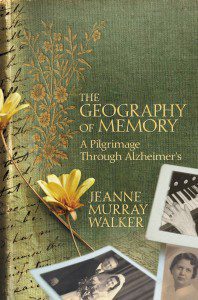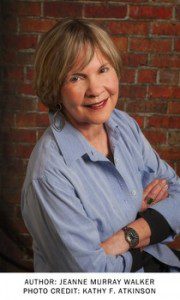 By Jeanne Murray Walker, author
By Jeanne Murray Walker, author
The Geography of Memory: A Pilgrimage Through Alzheimer’s
The aides are gathering the old people in the lounge to see the Animal Lady, who stops by my mother’s Alzheimer’s unit with a different pet every month. I am sitting beside mother, who is craning her neck to see. “Look,” I say. “She’s got a ferret.”
The woman gives a talk about the habits of this long, skinny creature, his natural surroundings. How he responds. She bribes the quick little mammal with food to perform tricks and then lets the old folks ask questions.
“Who takes the ferret swimming?”
“Where are the ferret’s children?”
“Who belongs to that ferret?”
They’re such wonderful questions! the Animal Lady exclaims jubilantly. She answers them and then rewards us by bringing the ferret around so each of us can pet it.
Although Mother never even liked our own dogs, when the ferret comes close, crawling on the arm of his owner, Mother valiantly reaches out her trembling hand and pets him. When one of the aides gets up and dances with the Animal Lady, Mother giggles. When the Lady gives a quiz at the end of the show Mother’s hand shoots up. She answers two questions: what do we feed ferrets, and do you like this ferret?
“Yes,” Mother shouts to the last question. She knows that’s the right answer. “Yes!” She crows with happiness.
Later, the aide leads mother and the other Alzheimer’s patients to the elevator. The aide is wearing a large yellow button: SMILE: GOD LOVES YOU! The residents, with their walkers, look like slow elephants whose knees are slipping down. From the line Mother waves to me.
I am thinking about how plucky she is.
But as I climb the steps alone to meet her in her second floor unit, I begin to feel despair. My sister and I—and the generous aides in this facility– are mother’s caretakers. There is a real sense in which I don’t have a mother any more. It feels more melancholy, sometimes, to have this kind of mother than not to have a mother at all. With longing, I recall what we might share if mother didn’t have Alzheimer’s: going to the symphony, taking walks together, shopping. But then if she didn’t have Alzheimer’s, maybe we wouldn’t see one another very often.
Suddenly I feel ashamed of myself. It is my mother I should be thinking about. Alzheimer’s is a terminal disease and this is her life. I am her daughter, walking this road beside her.
As I climb the steps to the second floor, in a flash I realize that I am on a kind of pilgrimage. In my mind’s eye I see a rocky, lonely path over a high mountain. I understand that what I have learned on this journey is something I could have learned no other way.
By the time I was sixteen, I had repudiated my parents’ politically conservative Baptist faith. I launched into anti-war protests and began surfing the intellectual landscape. I felt profoundly alienated from my mother, who was a young widow. Not that I entirely broke off the connection. But the two of us had so little in common. Eventually I joined an Episcopal church, where my deeply religious mother made it plain to me that she felt like an alien.
According to a 2011 study by the Pew Research Center’s Forum on Religion & Public Life, over half of Americans change their religious affiliation before the age of 24. It stands to reason, then, that in middle age many of us care for parents whose faith we have rejected. It is, I suspect, part of the awkwardness of the care-taking role, that we have chosen different paths from our parents.
But what I realized as I climbed the steps to my mother’s second floor unit was that whatever our formal religious affiliation, at some level, my mother and I both understood the Alzheimer’s years as a spiritual journey. I wasn’t sure what my mother was learning, but I was suddenly aware that I was acquiring spiritual disciplines: hospitality, patience, prayer, how to wait, how to let go.
Later that evening, I held mother’s hand and the two of us said the twenty third Psalm together. It was one of the few Biblical passages she remembered of the many she had learned. Hearing her, a person might think she had a perfect memory. As I kissed her good night, what I realized was this this: different as we were, when my mother and I said that psalm together, we probably meant pretty much the same thing.
 Jeanne Murray Walker is the author of The Geography of Memory: A Pilgrimage Through Alzheimer’s, now featured at the Patheos Book Club.
Jeanne Murray Walker is the author of The Geography of Memory: A Pilgrimage Through Alzheimer’s, now featured at the Patheos Book Club.













